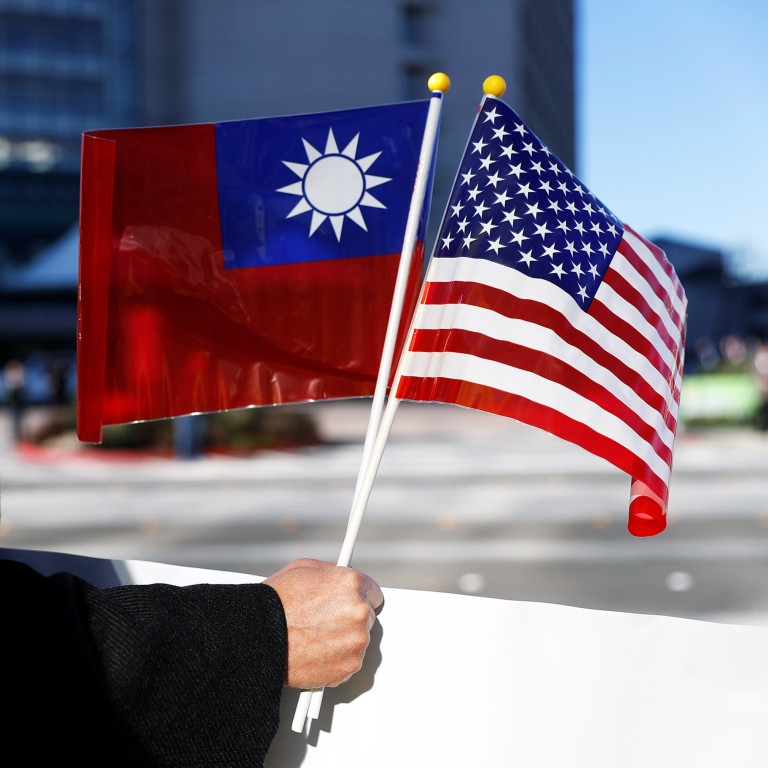
Beijing demands US halt biggest arms sale to Taiwan of Donald Trump’s presidency
- Pentagon agency approved US$2.2 billion sale on Monday – the fourth since Trump took over at the White House
- Taipei government says deal shows US support against Beijing threat and normalises US arms sales to Taiwan
Beijing has demanded the United States reverse its approval of the biggest arms sale to Taiwan since Donald Trump took over as US president, while Taipei said it showed Washington’s support in the face of growing military threats from mainland China.
The sale of equipment worth US$2.2 billion was approved by the US State Department on Monday, said the Defence Security Cooperation Agency, the Pentagon agency handling foreign arms sales.
“The second sale of arms to Taiwan [this year] is strong proof of the robust support of the US government for Taiwan and its defence need,” the ministry said in a statement on Tuesday.
Chinese foreign ministry spokesman Geng Shuang said on Tuesday that Taiwan could not be separated from mainland China, and that Beijing’s determination to maintain its territorial integrity should not be underestimated. He said the US should respect the one-China principle.
“The US should immediately withdraw the arms sales plan and stop military exchanges between the US and Taiwan, avoiding further damages to China-US relations and the stability of the Taiwan Strait,” he said.
The equipment to be sold includes 108 M1A2T Abrams tanks, 250 Stinger missiles and related equipment.
“Situated in the frontline of China’s expanding military ambition, and facing its persistent pressure and threat, our purchase of M1A2T tanks, missiles and other equipment is highly significant and helpful in upgrading our defence capability,” the Taipei foreign ministry said.
The US agency said the sale “would not alter the basic military balance in the region”, adding that it had notified Congress on Monday of the potential sale, which would also include mounted machine guns, ammunition, Hercules armoured vehicles for recovering inoperative tanks, heavy equipment transporters and related support.
The agency said the principal missile contractor would be Raytheon Missile Systems, and the MlA2T tanks’ prime contractor would be General Dynamics Land Systems.
The tanks would modernise Taiwan’s battle fleet and help it “meet current and future regional threats”, the agency said, adding that the deal would serve US interests by aiming to “improve the security of the recipient and assist in maintaining political stability, military balance and economic progress in the region”.
Trump reaffirms one-China policy in Xi call
Taiwan’s defence ministry said on Tuesday that the deal “indicates the US has normalised its arms sales process for Taiwan, with which the US has continued to consolidate its security and strategic partnership to jointly maintain freedom and democracy as well as regional peace and stability in the Indo-Pacific region”.
Chieh Chung, a national security research fellow at the National Policy Foundation in Taipei, agreed that the approval of the second US arms sale to the island this year was “proof of US normalisation of its arms sales for Taiwan”.
Last month, Randall Schriver, the US Assistant Secretary of Defence for Asian and Pacific Security Affairs, indicated in a seminar in Washington that Washington was committed to a process that would make Taiwan a “normal” foreign military sales partner.
“In addition to using the deal to warn Beijing over its military expansion in the region, the US announcement represents US goodwill for Taiwan,” Chieh said. “It is also meant to deliver a message to politicians, including those of the opposition Kuomintang, that whoever [in the Taipei government] is working with the US will get Washington’s support.”
The US has not had official relations with Taiwan since it switched diplomatic recognition to Beijing in 1979, but it has maintained close ties with the island and has been its principal arms supplier over the years.

